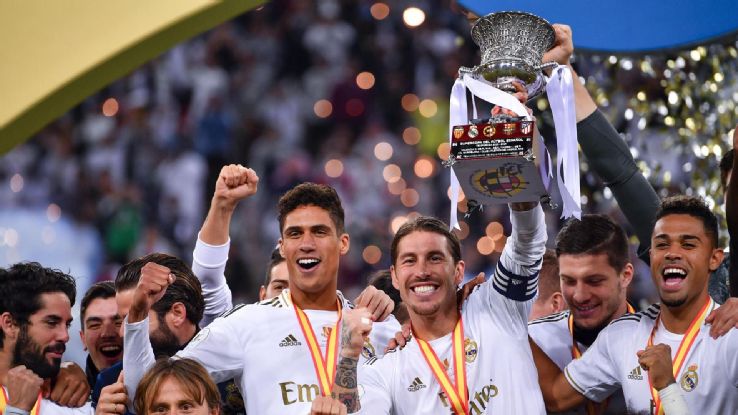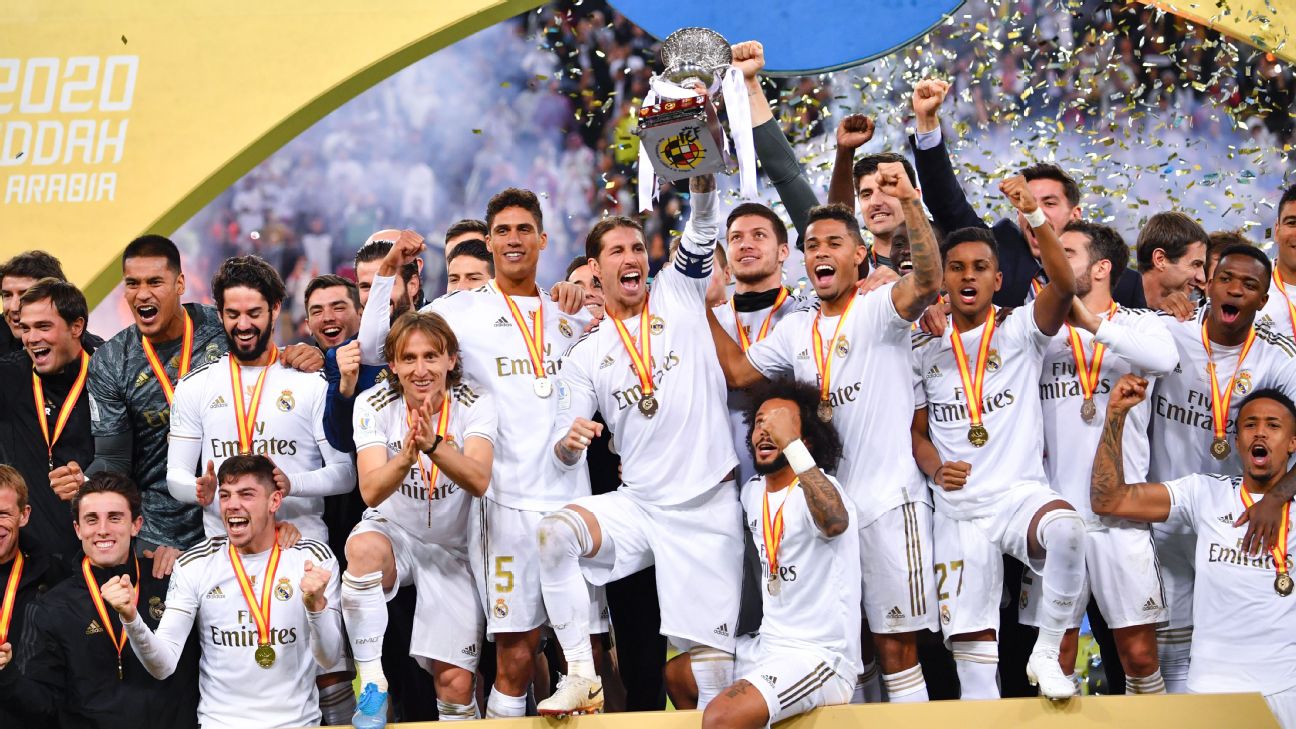Products You May Like


JEDDAH, Saudi Arabia — Two moments will be remembered from Sunday’s Spanish Supercopa final: Sergio Ramos‘ winning penalty in the shootout, which saw Zinedine Zidane make it nine wins in nine finals as Real Madrid coach, and Federico Valverde‘s last-man hack on Atletico Madrid striker Alvaro Morata in the final stages of extra-time.
“I apologise to Morata,” Valverde said after the game. “I know what I did wasn’t OK, but I didn’t have any other option.”
Valverde could have received two red cards for the challenge; one because Morata was clean through and another because of how dangerous it was. Matchwinner Ramos, who has been sent off more times than any other player in the history of La Liga, might just have been proud of his teammate’s “by any means necessary” approach.
Meanwhile, Atletico coach Diego Simeone, who approached the Uruguayan international as Valverde trudged off the pitch with the clock ticking towards 120 minutes, could not complain.
“He did what he had to do,” Simeone said. “I told him that anyone would have done the same in his position.”
None of which prevented Valverde, one of the revelations of Madrid’s season, being named Man of the Match, as chosen by a panel led by Spain coach Luis Enrique, who was present at the King Abdullah Stadium. Perhaps it even helped.
Without the intervention, Morata looked favourite to score and Atletico, not their local rivals, would have been celebrating a Supercopa in which, during previous years, they would not even have been involved.
The Royal Spanish Football Federation’s decision to expand the competition to four teams and relocate to Saudi Arabia made room for the two Madrid clubs. Traditionally, it would have been league winners Barcelona against cup winners Valencia, but a three-year deal — worth €120m — to take the competition to Jeddah meant it needed more of a pull.
Atletico, runners-up in La Liga last season, and Madrid, cup semifinalists and third-place finishers, were invited and they did more than make up the numbers, respectively knocking out Valencia and Barcelona to set up an all-Madrid final in another foreign city, following Champions League finals in Lisbon and Milan and a UEFA Super Cup in Tallinn.
Sunday saw little between the two teams over 120 minutes, with neither Jan Oblak nor Thibaut Courtois particularly overworked. Both did, though, make key saves: Jan the “Oblak-tapus,” as he has become known, pulled off a fine double stop from Luka Modric and Mariano Diaz, while Courtois had to be switched on to save from Vitolo and Angel Correa.
The two best chances of the game ended up off target. Early in the first half, €120 million man Joao Felix fired Atletico’s best chance the wrong side of the post after a Ramos error. And with the injured Karim Benzema, Eden Hazard and Gareth Bale all absent, Madrid took a midfielder-heavy approach; the ever-involved Valverde, one of their five, headed a glorious opening wide.
The game drifted towards extra-time as a chill began to fall but things did warm up in the bonus period and the winning moment looked certain to arrive when Morata raced through. The ex-Madrid man scored a decisive penalty in Thursday’s semifinal against Barcelona and looked set for an even bigger goal against his former club, before Valverde crunched in just outside the penalty area.
Dani Carvajal opened the shootout by scoring from 12 yards for Madrid, following which Rodrygo and Modric also converted successfully. It was a different story for Atletico: Saul Niguez hit the post and Thomas Partey was denied by Courtois.
Kieran Trippier did score with his side’s third effort, but that merely set the scene for Ramos, Madrid’s set-piece specialist in the post-Cristiano Ronaldo era, to score the winning penalty. Who else?
“I don’t like the word enemy but they’re one of the teams it’s more satisfying to beat,” Ramos had said before the game.
He scored the stoppage-time goal that took the 2014 Champions League final against Atletico to extra-time — Madrid went on to win 4-1 — and also scored in normal time and the penalty shootout when the cross-city rivals met at the same stage two years later.
When Ramos stepped up in front of the 59,053 predominantly pro-Madrid crowd, there was little doubt about the outcome, even with Oblak in goal. The Slovenian dived to his left and watched helplessly as the ball rolled into the opposite corner.
It means another trophy for Zidane the coach — his 10th in total — but this one has added importance, given it is the first since he returned for a second spell in charge. Madrid suffered without him, first with Julen Lopetegui and later under Santiago Solari, but there will be fresh hope that this trophy can be the catalyst for more success.
“I don’t know why, it’s just this club,” Zidane said. “We always want to win. This one wasn’t easy. We had to have patience. At half time we were a little annoyed because we didn’t know how we could score. We were up against a good team. You have to believe until the end and that’s what we’ve done.”
